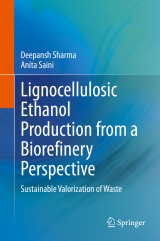Details

Lignocellulosic Ethanol Production from a Biorefinery Perspective
Sustainable Valorization of Waste|
96,29 € |
|
| Verlag: | Springer |
| Format: | |
| Veröffentl.: | 20.07.2020 |
| ISBN/EAN: | 9789811545733 |
| Sprache: | englisch |
Dieses eBook enthält ein Wasserzeichen.
Beschreibungen
This book provides an overview of the multi-dimensional approach for the production of ethanol from lignocellulosic biomass. The sustainability of this biofuel, the current and future status of the technology and its role in waste valorization are also addressed.<div><br></div><div>Bioethanol from lignocellulosic material has emerged as an alternative to the traditional first-generation bioethanol. The book also discusses various pretreatment methods for effective separation of the various components of lignocellulosic feedstock as well as their advantages, and limitations. It describes the valorization of lignocellulosic waste through the production of bioethanol and emphasizes the significance of waste utilization in managing the production cost of the fuel. Finally, the utilization of genetically engineered plants and microorganisms to increase the conversion efficiency is reviewed.<br></div><div><br></div><div><br></div>
<p>Chapter 1 Introduction to Lignocellulosic Ethanol.- Chapter 2. Cellulosic Ethanol Feedstock: Diversity & Potential.- Chapter 3. Pretreatment Technologies for Biomass Deconstruction.- Chapter 4. Saccharification Fermentation and Process Integration.- Chapter 5. Microbial and Plant Genetic Engineering for Efficient Conversions.- Chapter 6. Bioethanol: Product Separation Methods.- Chapter 7. Lignocellulosic Waste Valorization and Biorefinaries Concept.- Chapter 8. Fermentation Economics and Future Prospects.- </p>
<b>Dr. Deepansh Sharma</b> is working as an Assistant Professor (Microbiology) at Amity Institute of Microbial Technology, Amity University, Rajasthan. He has started his academic career as an Assistant Professor (Microbiology) at the School of Biotechnology and Bio-engineering, Lovely Professional University, Punjab, India. He has extensive teaching and research experience in the field of Fermentation Technology, Food Microbiology, Industrial Microbiology, and Microbial Technology. Previously, he has been selected for the Short-term scholarship (DAAD, Germany-2012) to work as an international visiting researcher at Technical Biology Branch II, Karlsruhe Institute of Technology, Germany. Furthermore, he is an active member of many scientific societies and organizations, including the Association of Microbiologists of India, American Society of Microbiology, European Federation of Biotechnology, and International Scientific Association for Prebiotics and Probiotics. Till now, he has published more than 35 peer-reviewed research articles, 5 books on microbial biosurfactants and applied microbiology and authored/co-authored chapters in various edited books. <br><div><br></div><div><b>Dr. Anita Saini</b> is working as an Assistant Professor of Microbiology at Shoolini Institute of Life Sciences and Business Management, Solan, Himachal Pradesh, India. Her research expertise involves microbial bioprospecting, production of lignocellulolytic and esterases enzymes, biomass pretreatment, and second-generation ethanol production. Till now, she has published more than 10 research and review articles in various peer-reviewed national/international journals and has authored/co-authored chapters in various edited books.<br></div>
This book provides an overview of the multi-dimensional approach for the production of ethanol from lignocellulosic biomass. The sustainability of this biofuel, the current and future status of the technology and its role in waste valorization are also addressed.<div><br></div><div>Bioethanol from lignocellulosic material has emerged as an alternative to the traditional first-generation bioethanol. The book also discusses various pretreatment methods for effective separation of the various components of lignocellulosic feedstock as well as their advantages, and limitations. It describes the valorization of lignocellulosic waste through the production of bioethanol and emphasizes the significance of waste utilization in managing the production cost of the fuel. Finally, the utilization of genetically engineered plants and microorganisms to increase the conversion efficiency is reviewed.</div>
<p>Gives comprehensive overview an all aspects of lignocellulose-derived bioethanol production</p><p>Covers the existing and emerging methods of pre-treatment of lignocelluloses</p><p>Reviews application of genetically engineered microorganisms and plants for higher conversion efficiency</p><p>Highlights new strategies for the waste valorization of lignocellulosic biomass</p>

















